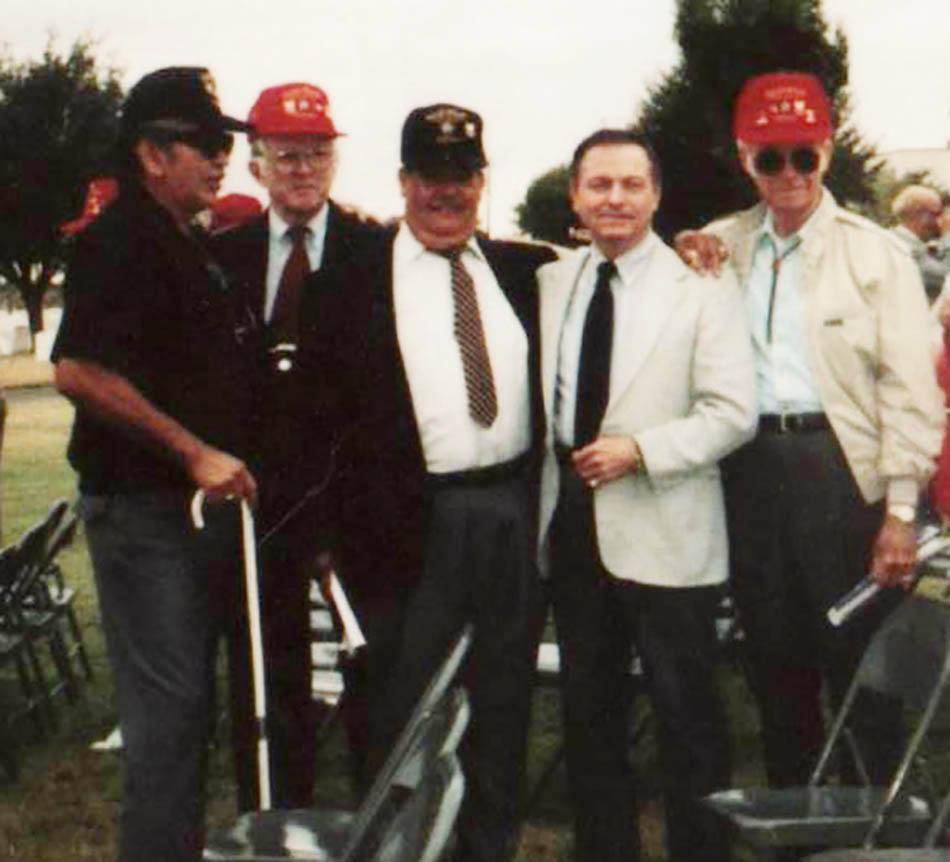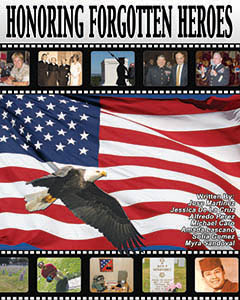
CWO3 LOU JURADO.
U.S. ARMY
If ever there was a true American Hero, it would be Lou Jurado. As a young man, Jurado showed diligence, perseverance and most importantly, loyalty for his fellow war comrades when he heroically saved the life of a soldier down. Unfortunately, that act of selflessness hasn’t garnered him much acknowledgment. But with the help of his supporters and the man whose life he saved, Lou Jurado is well on his way to becoming a recognized and rewarded American Hero.
Jurado was born in New Salem, Kansas in 1931. He explains that his family’s settlement there was almost an accident. His father, Bonefacio worked on the railroads of the Santa Fe Train. He would regularly commute back and forth between Oregon and their hometown of San Jose del Sitio, near Chihuahua, Mexico. When Jurado’s father and mother, Adriana, made the decision to move to the U.S., they believed their journey would leave them in Oregon, as it had done so many times before. Instead, they boarded in El Paso and arrived in New Salem, Kansas. So there they stayed and Jurado’s parents created a home and expanded their family.
Jurado was raised in a household of nine siblings and didn’t grow up as well-off as other kids. But the shortage of money and a growing family didn’t deter his childhood experience. “We grew up poor, but in those days you did not think much of it; we would make our own toys. To help the family, we worked cutting lawns, helping people run errands, moving stuff. Life was hard, but we made the best of it,” said Jurado.
At the age of 17, Jurado was inspired by two older brothers who were already serving in the military to join in. “I volunteered in September 1948 and served in the Korean War. I got my diploma in the US Army,” explained Jurado. He wanted to venture out of his comfort zone and experience things he’d only heard of. “I just wanted to get out of town and go overseas. I joined with four other guys. Our basic training was in artillery; we got a two-week vacation at home and then it was off to Okinawa, where I spent 18 months,” said Jurado.

Jurado received little time off, and soon he realized the Army life was a true commitment. “I came home for about a week and received a telegram to report to Headquarters Battery. We had to prepare for an overseas movement and I was being deployed from the Pacific Coast to Korea at the start of the conflict. We were the first forces to leave the West Coast, full battle ready with Am-tracks and all our weapons. We knew exactly where we were going even though our destination was never told to us,” explains Jurado.
Soon enough, he would face the reality of the front lines in the Korean War. “We landed in Puson, South Korea on July 1st, 1950 and the battle was in full throttle, we were probably about 1,200 soldiers,” remembers Jurado.
“We traveled that night by train to the front line and we were attacked and fired on. It sure puts the fear of God in you, the first time you know you can get killed at any moment,” added Jurado.
But fear couldn’t prevent Jurado from being the best he could be. Before long, his diligence earned him a promotion. “I was a Corporal when I arrived and became Sergeant about seven months later, while there on assignment,” said Jurado.
Unlike his fellow comrades, Jurado was not much of a drinker. But by winter of 1950, he and his men were running low on sustenance and alcohol was his only alternative. “We ran out of water and all we had was beer. The first time I was offered a beer, I did not realize it was my water ration for the duration there. We got two bottles of San Miguel Beer each day. Later, I found out that General McArthur owned this brewery in the Philippines,” said Jurado.
In January of 1951, Jurado went on a standard mission to recover paperwork from Sergeant First Class Eduardo Fernandez.
When they met again in February of that year during the battle at Chipyong-ni, Jurado knew Fernandez as a stern and serious Sergeant. “He was our calisthetics trainer and I remember he was in great shape. He would work us until we dropped,” said Jurado.
As luck would have it, Jurado, as he didn’t drink, would regularly hand over his portion of alcohol. “We would get a bottle of liquor like once a month and I did not drink so I would always give mine away.” So, on one ordinary occasion of finding someone to give his liquor to, Jurado stopped to visit Fernandez and offer him his bottle. On this fateful night, Jurado’s presence saved the life of the higher-ranking Fernandez.
“I had just gone there to give them a bottle of liquor, as I did not drink, and Eduardo greeted me and then asked that I go down the valley to the Drop Zone with him and get ammunition and supplies. Fernandez had been there several times before,” said a reminiscent Jurado. But this visit proved to be different.
He was weary that it would be too dangerous to go there because it was dark and the Drop Zone is an open space where the enemy could attack at any time, but he trusted Fernandez and agreed to go anyway.
“We zigzagged our way down the hill and our first trip down was successful. Mortar fire came in and they were firing at us, but it usually takes them a while until they get zeroed in on their target. Sgt. Fernandez said we’d have to go again for more supplies, and we knew this time it would be much more dangerous, so we only carried what we needed. But this time our luck ran out,” added Jurado.
Jurado remembers that suddenly Fernandez was severely wounded. “He took almost a direct hit with mortar fire,” said Jurado. And after being thrown from the impact of the firing, Jurado bravely went to check on Fernandez. “I looked at Fernandez and he was moaning and groaning pretty bad. His leg was bleeding profusely, and his abdominal area was in bad shape as well,” explained Jurado.
Through courage and pure adrenaline, Jurado managed to carry out the larger and taller Fernandez a quarter of a mile up the hill and out of the Drop Zone. “The Sergeant was probably 5’11,” about 185 pounds, very muscular. I was 5’ 7” and weighed about 130, but it never crossed my mind to leave him there. I would encourage him as he hobbled on one leg back up the hill. I tried carrying him on my shoulders and at times just dragged him,” explained a nearly emotional Jurado.
Even when the two men reached the top of the hill, Jurado did not concern himself with his own trauma, instead insisted Fernandez get help. “I was also hit with shrapnel in my leg but I was not concerned with my wounds. When we arrived at the top, there were medics waiting for us. I was pressing them to help the Sergeant because they were trying to help me. I was telling them that he was going to die, and they immediately gave him a blood transfusion,” said Jurado.
This chance encounter with a Sergeant ended up being just that, a chance. “That was the last time I saw Fernandez,” said Jurado. But their separation didn’t stop Jurado from inquiring about his new friend.
“I was patched up; they removed the shrapnel, sewed me back up and sent me back to the front lines again. I was promoted to Sergeant First Class and was stationed with personnel toward the end of my time in Korea. Everywhere I went, I would look for my friend Eduardo Fernandez and never could find him.”
After years of unsuccessfully searching for his friend, Jurado tried to focus on his life outside the military, but always returned to it. “When I came home from Korea, I got married but could not find a good job to raise a family. So I asked my wife if she wanted to be a career military wife, always on the go and she said ‘yes.’ I was making good money as a Sergeant First Class, so I reenlisted and I was assigned to Fort Custard, Michigan for a while, then I transferred to North Carolina where I was assigned to the JAG, still on an airborne facility,” said Jurado.

Jurado later went back to school and continued to play an important role in the U.S. Military, until his retirement a few decades later. “I went to school as a Nuclear Weapons Officer and became the Nuclear Weapons Officer for the State of Kansas, which was my last assignment. I retired after 20 years as a Chief Warrat Officer 3; I had found out that my next assignment would be in Korea unattached and that did not sit well with the family, so I retired,” explained Jurado.
Since his retirement, Jurado has made his family his number one priority. “I have one adopted son and two of my own. My adopted son Manuel Gerardo retired from the Army and is living in Denver, Colorado with his family. I invested in a business here just 20 miles outside Kansas City, just a small town community, and later sold appliances in the nearby communities. Today I am a retired happy great-grandfather,” said a proud Jurado.
It wasn’t until later in his life that Jurado was finally able to meet the man whose life he saved and the bond they’d created was expressed through their encounter once again. “We finally met like in 1994 at a reunion for Korean War Veterans and we got to talk about old times. Ed lifted his shirt up and he had so many holes! I think he has had over 70 surgeries for his wounds. He retired a Master Sergeant, which is a very big deal in the Hispanic military community. My ordeal with Eduardo Fernandez is deep in my heart and hard to talk about. We saw so many of our friends killed, we’re just grateful to be alive,” said an emotional Jurado as he would pause his words to prevent his tears from coming.

Despite his act of courage, the humble Jurado takes little credit for what he did and says his belief system is what got him through it. “My wife asked me if someone has ever helped me and I told her to this day I believe someone did help me, and that was the hand of God who gave me the strength to save this man who I never even thought of leaving behind. He put the courage in me,” said Jurado.
Once the two men met again, Jurado became informed that Sergeant Fernandez opened up a bar/restaurant in 1994 named “Drop Zone,” in reference to the place where Jurado saved Fernandez. Fernandez had also been searching for Jurado and when he was unsuccessful in doing so, he opened up this bar as a dedication to him and to all the soldiers who bravely risked their lives for those of their comrades.
The two began a friendship again in 1996 and have remained close friends ever since. Fernandez and his wife have been working tirelessly to give Jurado the proper recognition he deserves.
Though he triumphantly and selflessly rescued Fernandez, Jurado has been unsuccessful in receiving any type of government recognition; no Medal of Honor was ever administered to him for his bravery. “I know Ed’s wife is trying to get some kind of medal for me, although I never did it for any medal. It has shaped my life in a positive way and today I was able to tell you my story. That is reward enough for me. I was the recipient of a Purple Heart from previous wounds, but nothing for the battle at Chipyong-ni, February 1951,” said Jurado.
Jurado is a true American Hero with a humble heart that makes him all the more likable. His brothers’ influence prepared him for a career of combat, and his tight-knit family allowed him to appreciate domestic life. The Battle at Chipyong-ni tested his loyalty to his fellow soldiers, even those he’d just met, and Lou Jurado didn’t disappoint; this makes him a real American Hero.
— Story by: Jessica De La Cruz - Interview by: Alfredo Perez




Private Lou Jurado

Son Manual Jurado
|
|



CLICK HERE FOR TABLE OF CONTENTS

|
